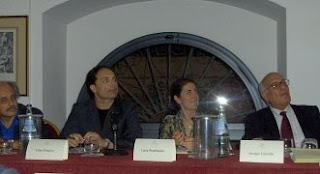With the help of the man from the local computer shop, I have at last been able to upload the second TV interview about the poetry book translation onto youtube. Well, he did it, really, and it took 3 hours!
Antonio Lonardo and Pat Eggleton interviewed by Fabio Pompeo Iacono on reteiblea, 11.6.09.
English transcript:
FPI: Antonio Lonardo’s poetic adventure having begun almost by chance, it is with great pleasure that we now welcome a fourth paperback volume to this much appreciated series; this volume contains an output which is lyrical in every sense of the word.
He has participated in many national and international literary competitions, for which he has entered single poems, unpublished collections and his first book, Desiderio di Luce [Wishing for Light], which has received no less than ten prizes in just two years.
For Lonardo, writing poetry is a game of chance, as is, for the most part, entering poetry competitions: whenever he takes on the challenge, his work becomes better appreciated in various parts of Italy and it is often listed among the winners in the final results, even when the competition has been fierce.
[From dust cover notes by Antonio Daniele for Le stagioni del Cuore and Il Profumo del Pensiero.]
AL: Well, I'm half a teacher and this literary intention came to me from very far away. I was born in the Province of Avellino and I became a teacher. I've been in Modica since 1983. First I taught middle school and then I taught at the Archimede Economic Liceo [ITCS Archimede]. I started writing in 1977 when I had a bereavement. My fiancée died and I was grieving over this loss. From this all the rest came about. Obviously I couldn't go on crying so I thought about new themes, those that reflected my cultural interests, such as foreign politics, the observation of reality and the heart, my own heart. I dedicated many poems to my family, friends, to others and myself. Obviously all this happened after a lot of observation and deep meditation about my great interests.
I've had the courage to enter many poetry competitions and in 3 years I've won 40 prizes, some of them quite important ones, for single poems, collections and the works I've published since 2005. The highest honour I've received is the President of the Republic's Medal, awarded at Buggiano in Pistoia 2 years ago.
PE: I write a blog about my experiences in Sicily. I happened to be at the launch of AL's second collection and I asked him if I could write about him and translate one of his poems for the blog. He agreed, read the blog article and then contacted me to ask if I'd be interested in translating a new collection. I said I would.
I found the work both interesting and demanding because it's not enough to know the meaning: you have to find the word that is exactly right, let's say the most poetic and musical word. You have to find the right word in all translation but poetry is different. For example, in the poem Metamorfosi we have the word linguaggio. In English , "language" means language in general. We don't have a word to [collectively] describe particular types of language. Finally I decided to use the word "language" in the translation and render its sense in the rest of the verse. There are always decisions like this to make.
Then there are grammatical aspects. English syntax is different, for example . Sometimes I had to change not only the word order but the punctuation - in fact, the entire verse structure.
Il Poeta is read in Italian and in English.






























